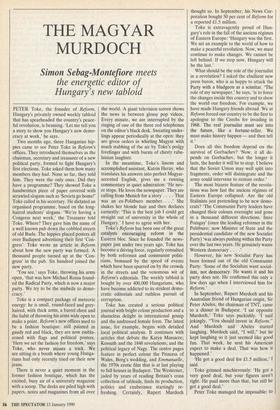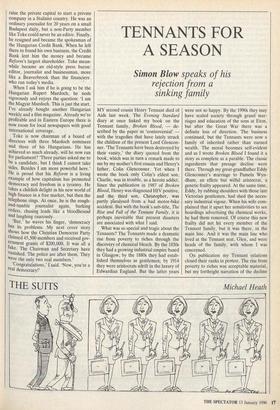THE MAGYAR MURDOCH
Simon Sebag-Montefiore meets the energetic editor of Hungary's new tabloid
PETER Toke, the founder of Reform, Hungary's privately owned weekly tabloid that has spearheaded the country's peace- ful revolution, is beaming. 'Let me tell you a story to show you Hungary's new demo- cracy at work,' he says.
Two months ago, three Hungarian hip- pies came to see Peter Toke in Reform's offices. They introduced themselves as the chairman, secretary and treasurer of a new political party, formed to fight Hungary's first elections. Toke asked them how many members they had. None so far, they told him. They were the only ones. Did they have a programme? They showed Toke a handwritten piece of paper covered with scrawled slogans such as `Soviets go home!' Toke called in his secretary. He dictated an organised programme, based on the long- haired students' slogans. 'We're having a Congress next week,' the Treasurer told Toke. Where? They gave him the name of a well known pub down the cobbled streets of old Buda. The hippies placed posters all over Budapest advertising their first 'Con- gress'. Toke wrote an article in Reform about how the new party was formed. A thousand people turned up at the 'Con- gress' in the pub. Six hundred joined the new party.
`You see,' says Toke, throwing his arms open, 'that was how Michael Rozsa found- ed the Radical Party, which is now a major party. We try to be the midwife to demo- cracy.'
Toke is a compact package of meteoric energy: he is small, round-faced and grey- haired, with thick arms, a barrel chest and the habit of throwing his arms wide open to make a point. Reform's new offices used to be a fashion boutique: still painted in gaudy red and black, they are now embla- zoned with flags and political posters. `Here we set the fashion for freedom,' says Toke, who never misses a trick. We are sitting in a booth where young Hunga- rians had only recently tried on their new jeans.
There is never a quiet moment in the former fashion boutique, which has the excited, busy air of a university magazine with a scoop. The desks are piled high with papers, notes and magazines from all over the world. A giant television screen shows the news in between glossy pop videos. Every minute, we are interrupted by the ringing of one of the three red telephones on the editor's black desk. Sweating under- lings appear periodically at the open: they are given orders in whirling Magyar with much stabbing of the air by Toke's podgy forefinger and with bursts of chesty rabe- laisian laughter.
In the meantime, Toke's lissom and accomplished assistant, Katrin Heray, who translates his answers into perfect Magyar- accented English, gives me a running commentary in quiet admiration: `He nev- er stops. He loves the newspaper. They are calling from Munich for a story . . . That was an ex-Politburo member. . .' She shakes her blonde hair and then declares earnestly: 'This is the best job I could get straight out of university in the whole of Hungary.' I have to agree with her.
Toke's Reform has been one of the great catalysts encouraging reform in the Eastern bloc. Since he founded the news- paper just under two years ago, Toke has become a driving force, regularly consulted by both reformist and communist politi- cians, bemused by the speed of events which have been spurred on by the crowds in the streets and the venomous wit of Reform's editorials. The weekly tabloid is bought by over 400,000 Hungarians, who have become addicted to its strident demo- cratic editorials and ruthless pursuit of corruption.
Toke has created a serious political journal with bright colour production and a shameless delight in international gossip and the undressed female form. The latest issue, for example, begins with detailed local political analysis. It continues with articles that debate the Katyn Massacre; Kossuth and the 1848 revolutions; and the political legacy of Nagy. The centre pages feature in perfect colour the Princess of Wales, Borg's wedding, and Emmanuelle, the 1970s erotic film that is at last playing to full houses in Budapest. The Westerner, jaded by years of reading Britain's crass collection of tabloids, finds its production, politics and exuberance startingly re- freshing. Certainly, Rupert Murdoch thought so. In September, his News Cor- poration bought 50 per cent of Reform for a reported £1.5 million.
Toke is extravagently proud of Hun- gary's role in the fall of the anciens regimes of Eastern Europe: `Hungary was the first. We set an example to the world of how to make a peaceful revolution. Now, we must continue to make changes. We cannot be left behind. If we stop now, Hungary will be the last.'
What should be the role of the journalist in a revolution? I asked the ebullient new press baron, who is as happy to attack the Party with a bludgeon as a scimitar. 'The role of my newspaper,' he says, 'is to force the changes inside this country and to show the world our freedom. For example, we have made Hungary friends abroad. We at Reform forced our country to be the first to apologise to the Czechs for invading in 1968. The real journalist must see into the future, like a fortune-teller. We must make history happen — and then tell it.'
Does all this freedom depend on the survival of Gorbachev? `Now, it all de- pends on Gorbachev, but the longer it lasts, the harder it will be to stop. I believe that the Soviet Union may well split into fragments, order will disintegrate and the army could intervene to restore order.'
The most bizarre feature of the revolu- tions was how fast the anciens regimes of Eastern Europe collapsed. Are the old Stalinists just pretending to be new demo- crats? `The Communist Party leaders have changed their colours overnight and gone in a thousand different directions. Imre Pozsgay' (once the leading reformer in the Politburo; now Minister of State and the presidential candidate of the new Socialist Party) `was always pushing within the Party over the last two years. He genuinely wants Western democracy . . .
However, his new Socialist Party has been formed out of the old Communist Party: `Some of the Socialists want social- ism, not democracy. He wants it and his party does not. He confirmed this only a few days ago when I interviewed him for Reform.'
In September, Rupert Murdoch and his Australian friend of Hungarian origin, Sir Peter Abeles, the chairman of TNT, came to a dinner in Budapest. `I sat opposite Murdoch,' Toke says puckishly. 'I said jokingly, "You should invest in Reform." And Murdoch and Abeles started laughing. Murdoch said, "I will," but he kept laughing so it just seemed like good fun. That week, he sent his American expert to make a deal. That was how it happened.'
`He got a good deal for £1.5 million,' I said.
Toke grinned mischievously: `He got a very good deal, but your figures aren't right. He paid more than that, but still he got a good deal.'
Peter Toke managed the impossible: to raise the private capital to start a private company in a Stalinist country. He was an ordinary journalist for 20 years on a small Budapest daily, but a non-Party member like Toke could never be an editor. Finally, he resigned and became the spokesman of the Hungarian Credit Bank. When he left there to found his own business, the Credit Bank lent him the money and became Reform's largest shareholder. Toke mean- while became an old-style press baron: editor, journalist and businessman, more like a Beaverbrook than the financiers who run today's media.
When I ask him if he is going to be the Hungarian Rupert Murdoch, he nods vigorously and enjoys the question: 'I am the Magyar Murdoch. This is just the start. I've already bought another Hungarian weekly and a film magazine. Already we're Profitable and in Eastern Europe there is now room for local newspapers with good international coverage.
Toke is now chairman of a board of directors with three Murdoch nominees and three of his Hungarians. He has achieved so much already, will he now run for parliament? 'Three parties asked me to be a candidate, but I think I cannot take sides. Besides I am more powerful here.' He is proud that his Reform is a living example of how capitalism has promoted democracy and freedom in a tyranny. He takes a childish delight in his new world of high finance in a free market, but then the telephone rings. At once, he is the rough- and-tumble journalist again, barking orders, chasing leads like a bloodhound and laughing raucously. `But,' he waves his finger, 'democracy has its problems. My next cover story shows how the Christian Democrat Party claimed 45,500 members and received gov- ernment grants of $200,000. It was all a fake. The Chairman and Secretary have vanished. The police are after them. They were the only two real members.' `Congratulations,' I said. 'Now, you're a real democracy!'











































 Previous page
Previous page